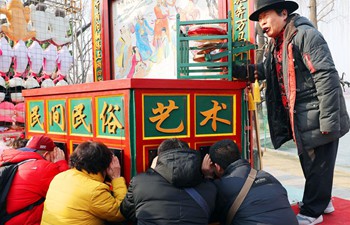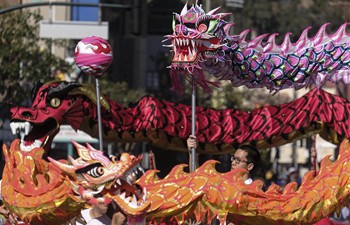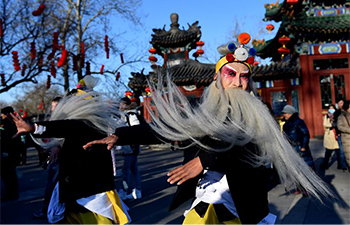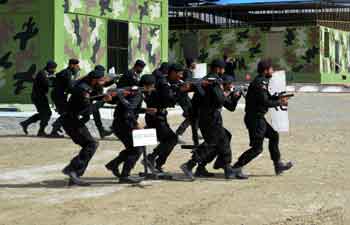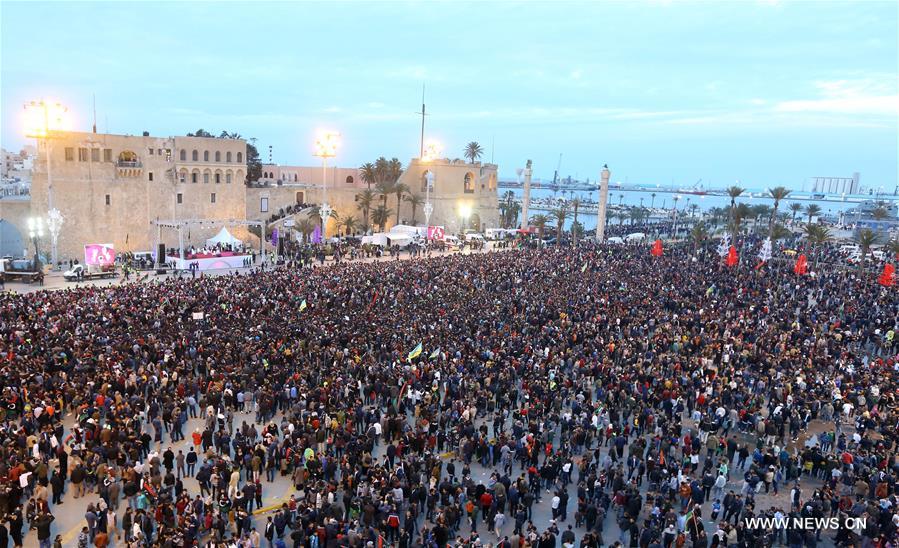
Libyans gather on Martyrs' Square in Tripoli, Libya, on Feb. 17, 2018. Tens of thousands of Libyans on Saturday gathered in the capital Tripoli's Martyrs' Square, a symbol of the protest in 2011, carrying Libyan flags to mark the 7th anniversary of the outbreak of the Libyan uprising. (Xinhua/Hamza Turkia)
by Mahmoud Darwesh Nawas Darraji
TRIPOLI, Feb. 18 (Xinhua) -- Many Libyans have regretted the uprising that toppled former leader Muammar Gaddafi seven years ago as it caused long-term insecurity and political division, as well as an economic crisis in the oil-rich country.
Tens of thousands of Libyans on Saturday gathered in the capital Tripoli's Martyrs' Square, a symbol of the protest in 2011, carrying Libyan flags to mark the anniversary that falls on Monday.
"The Libyan people have suffered a lot because of political differences. Some politicians have tried to incite military action against some cities because of political divergence. This has damaged the social fabric in many cities and areas," Shawosh told Xinhua.
Miloud Shawosh, a 50-year-old civil servant, attended the gathering with his wife and three children.
"We are a highly interdependent tribal society. There is a familiarity and relationship between many segments of society. Unfortunately, some people were working to destroy this interconnected fabric, but we have recently showed our support for reconciliation and peace," he said.
Twenty-year-old university student Noura Shebani told Xinhua, "The "revolution was a great disappointment for us. Outsiders and stakeholders jumped on the backs of the martyrs and casualties. They promised us to improve living conditions and give back our stolen rights to us. But all that has happened is lies, leading us to an abyss."
Since the fall of Gaddafi's regime, Libya has been struggling to form a security service capable of countering the armed militias, which outnumber the regular forces. The north African nation has also been plagued with political division.
Fatima Tajouri, who lost her two sons in 2011, said "When my children went to Sirte in early October, they told me that their lives were a sacrifice for every Libyan to live a decent life. Unfortunately, many Libyans failed us by misrepresenting the revolution with their practices and presenting a negative image of us after we lived in dignity."
"I am sad that my dearest sons died, but even sadder about the threat of losing Libya, because I am afraid that all will be lost at once," the mother said, holding a picture of her two sons.
Faraj Erheil, a 58-year-old physician, believes that the "sacrifices of young people for the revolution should be remembered in order to avoid the mistakes that once led us to an unknown fate."
"Our youths did not revolt against Gaddafi's regime with a new injustice as a replacement; they revolted for their dignity and stolen rights. However, unfortunately, we failed to preserve the gains of the revolution," Erheil told Xinhua.
Despite the lasting political and economic crises, the Libyans have also cherished hope for a better future.
Shawosh said the revolution, despite its failure, still has a chance. "We are determined to complete the journey towards establishing a desired state."
"Many cities and tribes have reconciled and put their differences aside, because they know conflicts will not serve anyone," Shawosh added.
Tajouri said that she was optimistic that the revolution will achieve all its goals someday.
"We will not lose Libya ... We will work hard for the sake of our country, take back our place, serve justice, and reject war and hatred. We are at a stage where we cannot afford to lose any precious Libyan," Shebani said.




